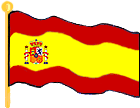Pinto pinto gorgorito
"Pinto, pinto gorgorito" is a Spanish rhyme like "Eeeny Meeny Miney Moe"...
"Pito pito gorgorito" is a variation of the 1st line.
Pinto pinto gorgorito
Speckled, Speckled, Trill, Trill
Rima de sorteo
Counting-out Rhyme
(Spanish)
(English)
Pinto, pinto,
gorgorito
dónde vas
tú tan bonito
a la era verdadera,
pim, pam,
pum, fuera.
Speckled, speckled,*
Trill, trill
Where are you going?
You, so beautiful!
To the verdant threshing floor*,
Pim, pam,
Pum, get out!
Notes
*"Pinto" means "speckled", "spotted" while the variation "pito" means "whistle" or "woodpecker" –or any bird of the picidae family. "Gorgorito" is the trill birds make when singing –or people when gargling!
**A threshing floor is a smooth floor where a farmer would beat the grain harvest and then separate the grain from the chaff (the seed casing). This line can also be found as "a la acera verdadera" (to the verdant sidewalk).
Sigourney wrote, "Historically, in all of the place names of the western part of the peninsula, names with 'verd' come from verde (green) that is verdant (i.e. green, in full bloom). Adding 'era' to get 'verdadera' makes it a plot of land near the house where greens are cultivated during the first months of the year. That coincides with the birds mating season, when they wear their best colors, and when the pantries are emptied and people go bird hunting. I hope this explanation will be of some help."
This line can also be found as "a la acera verdadera" (to the greening sidewalk).
*****
A slightly different version:
Pinto, pinto, gorgorito (Speckled, speckled chirp)
dónde vas tú tan bonito (Where are you going, you so pretty?)
a la acera verdadera, (To the verdant sidewalk)
pim, pam, pum, fuera, (Pim, pam, poom, get out)
tú te vas y tú te quedas. (You go away and you stay.)

Thanks!
Pito, pito, gorgorito (Whistle/woodpecker, whistle/woodpecker, chirp)
¿Dónde vas tú tan bonito? (Where are you going, you so pretty?)
A la era de mi abuela (To my grandma's threshing floor)
Pim, pom, fuera, (Pim, pom, go out)
La vaca lechera (The dairy cow)
Le dijo a Pinocho (Told Pinocchio)
Que contara hasta ocho. (To count up to eight)
¡Uno, dos, tres, cuatro, (One, two, three, four)
Cinco, seis, siete, ocho! (Five, six, seven, eight!)
Thanks!
Thanks and Acknowledgements
Thanks to Sigourney Di Blasi for her help.
Translated by Lisa and Monique.
























